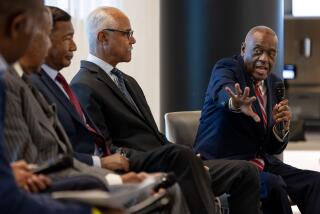The Colonel and the Kids : Retired Officer Creates a Resource Center to Help Troubled Youths--and Himself
- Share via
Sheldon Sutherland moved away from the old neighborhood three weeks ago. But every day, Sheldon, 17, takes a bus from Inglewood back to L.A.’s West Adams district to hang out at the Colonel’s.
Peter Perales is a troubled boy whose words (“You know, when you been messing up as long as I have . . . “) sound twice his 11 years. But he’s doing better now, “thanks to Tom. He’s the best thing that ever happened to me.”
Tom, the Colonel, is retired Air Force Lt. Col. Tom Norris, who runs a neighborhood “resource center” in his backyard. On an average afternoon, three dozen neighborhood youths, many from broken homes, gather there to do homework on one of the seven computers in a storage room, play basketball, learn about responsibility--and stay out of trouble.
“I’d just be at home watching television,” said Carmello Jones, 15, taking a break from painting a floral watercolor.
“I want them to learn a little about life,” Norris said, “and know that it is not all negative.”
It’s a lesson the Colonel knows plenty about.
He was in his mid-30s when cancer struck, taking both testicles. Soon after, both of his parents died.
“I was not married. I had no children, and I got to thinking, ‘What is there for me?’ ” he said.
Then things got worse.
An excessive dose of radiation treatment led to such excruciating pain that the once-powerful 6-foot-2 man was bedridden for more than a year. Eventually the Air Force discharged him.
Three years after the cancer was diagnosed, Norris was introduced to Marianne Muellerleile, an actress. A year later they were married.
A while later, in 1991, a friend, Miguel Martin, mentioned that his son, Ricky, 8, was doing poorly in school because he couldn’t read. Norris offered to teach the boy.
Gradually he also started helping Ricky’s sister and their friend. Word spread through the neighborhood, and the resource center began to take shape.
“If someone told me I’d be helping kids for a living, I’d have said they were nuts,” said Norris, who lives on Air Force disability pay. He makes no money working with youths (his wife estimates that they sometimes spend hundreds of dollars a month out of their own pockets), but he is fulfilled.
“This makes me feel like I’m giving something back, like I’m being productive again,” he said. “Just to see a smile where there was none. To teach them about honesty. To see them help each other.” Plus, it takes his mind off the physical pain that still strikes unpredictably.
He looks out at a group of kids and points to one boy absorbed in a comic book.
“That’s Javier,” he said. “He’s like the son I never had. He has no idea who his father is. He told me the other day, ‘They used to call me bastard. It really bothered me. Now, it doesn’t bother me because I have you. You’re my father.’ I almost started to cry.”
The resource center was adopted by the Adams Normandie Neighborhood Assn., a nonprofit group that contributes $75 a month to help Norris. He welcomes the help; Kool-Aid alone during the summer sets him back $40 a month.
Some funding comes from an annual yard sale that the neighborhood group puts on. Neighbors and friends contribute items for the sale, which takes on a small-town atmosphere. This year’s event is scheduled for Oct. 19.
At first, Norris’ backyard and storage room provided plenty of space. But now, with 55 children signed up, the facilities are cramped. Norris is looking for a way to expand. He and Marianne dream of somehow being able to buy another house down the street and use it just for the kids. But the house’s price is $200,000.
Sitting in his backyard full of children, with two huge sago palm trees providing welcome shade in the blistering sun and cherry Kool-Aid to quench his thirst, Norris reflected on his military career. Someone suggested that since he was only 37 when he became a colonel, he could have very well made it to general.
Norris laughed.
“Yeah,” he joked, “I coulda been a contender.”
For the kids, he is much more.
“If you have a problem you can come to Tom,” said Victor Mendez, 16. “Your dad might be working or not around, but Tom will be here for us.”
Recently, Norris was working with a teenager named Miguel, frantically trying to finish algebra homework so the boy would get a passing grade in class. Out of nowhere, Norris was gripped by another pain attack, traveling in a dreadfully familiar hip-to-groin-to-stomach route.
He has two options when this happens: Take pills to knock out the pain--and himself--or fight it off.
This time the Colonel sucked it in. The lesson continued.
Miguel passed algebra.
More to Read
Sign up for Essential California
The most important California stories and recommendations in your inbox every morning.
You may occasionally receive promotional content from the Los Angeles Times.










